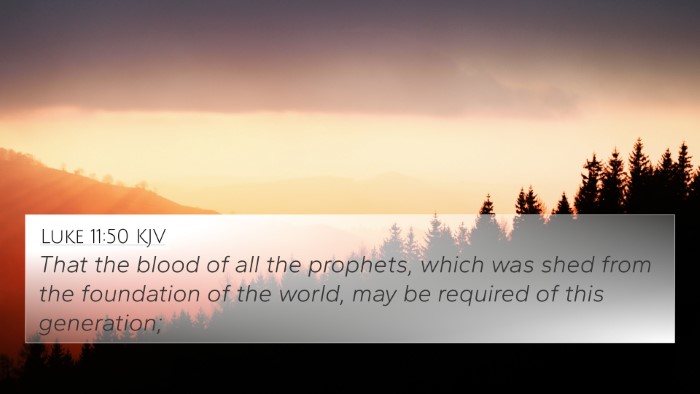Bible Verse Meaning: Genesis 43:9
Verse Reference: Genesis 43:9 - "I will be surety for him; of my hand shalt thou require him: if I bring him not unto thee, and set him before thee, then let me bear the blame for ever."
Contextual Overview
This verse comes at a critical moment in the narrative of Joseph and his brothers. The brothers have come to Egypt during a time of famine and are unaware of Joseph's true identity. The circumstances have created tension and the necessity for Benjamin’s presence to secure their brother Simeon’s release. Judah steps up in a moment of desperation, offering himself as a pledge for Benjamin.
Commentary Insights
-
Matthew Henry:
Henry emphasizes the moral implications of Judah's pledge. Judah's offer to take responsibility for Benjamin reflects a sense of brotherly love and the weight of familial duty. He understands the consequences of his actions and is prepared to face them, exemplifying deep commitment and sacrifice.
-
Albert Barnes:
Barnes points out that Judah's willingness to become a surety for Benjamin illustrates an act of courage and accountability. The assurance he gives indicates trust and the seriousness of the situation they face. This moment highlights character development and the strength of family bonds amidst adversity.
-
Adam Clarke:
Clarke delves into the cultural context of suretyship, noting that taking responsibility for another's safety was a profound commitment in ancient times. He comments on how Judah’s declaration shows a transformation in the brothers' attitudes, moving from self-interest to a sense of collective accountability.
Thematic Connections
Genesis 43:9 can be connected to various themes in scripture, emphasizing responsibility, brotherhood, and redemption. The nature of commitment and the willingness to sacrifice for others resonates throughout the Bible, reinforcing moral and spiritual lessons.
Cross-References to Genesis 43:9
- Genesis 37:26-27 - Judah’s earlier proposal to sell Joseph reflects a contrasting attitude towards family duties.
- Genesis 44:32-33 - Judah’s further plea for Benjamin illustrates his growth and continued commitment to family.
- Romans 15:1 - "We then that are strong ought to bear the infirmities of the weak," showing the scriptural principle of taking responsibility for one another.
- John 15:13 - "Greater love hath no man than this, that a man lay down his life for his friends," paralleling Judah’s willingness to sacrifice.
- Galatians 6:2 - "Bear ye one another's burdens," an exhortation that aligns with Judah’s pledge for Benjamin.
- Job 17:3 - Job asks for a surety, representing the desire for support in difficult times.
- Hebrews 7:22 - Refers to Christ as the surety of a better covenant, tying the theme of assurance and responsibility into the New Testament.
- 2 Corinthians 5:21 - Here, Paul speaks of Christ’s sacrifice, connecting the idea of taking on sin for another, much like Judah's pledge.
- Acts 2:24 - This passage discusses God's plan of redemption through the sacrificial act of Jesus, reminiscent of Judah’s willingness to bear blame!
- 1 John 3:16 - "Hereby perceive we the love of God, because he laid down his life for us," echoing the theme of sacrifice for loved ones.
Conclusion
Genesis 43:9 serves as a profound example of the themes of family, responsibility, and sacrifice that run throughout the Bible. Judah's vow to be surety for Benjamin not only highlights the complexities of familial relationships but also illustrates deep moral and ethical lessons that can be drawn upon through cross-referencing other scriptures. Understanding these connections enhances our insight into Biblical text and allows for a richer interpretation of the narratives.
Keywords:
- Bible verse cross-references
- Connections between Bible verses
- Linking Bible scriptures
- Comparative Bible verse analysis
- Bible verses that relate to each other
- Cross-referencing Biblical texts
- Thematic Bible verse connections
- Bible verse parallels
- Scriptural cross-referencing
- Inter-Biblical dialogue
For those seeking to enhance their Bible study, utilizing tools for Bible cross-referencing can provide deeper understanding and insight into the connections between scripture.
















